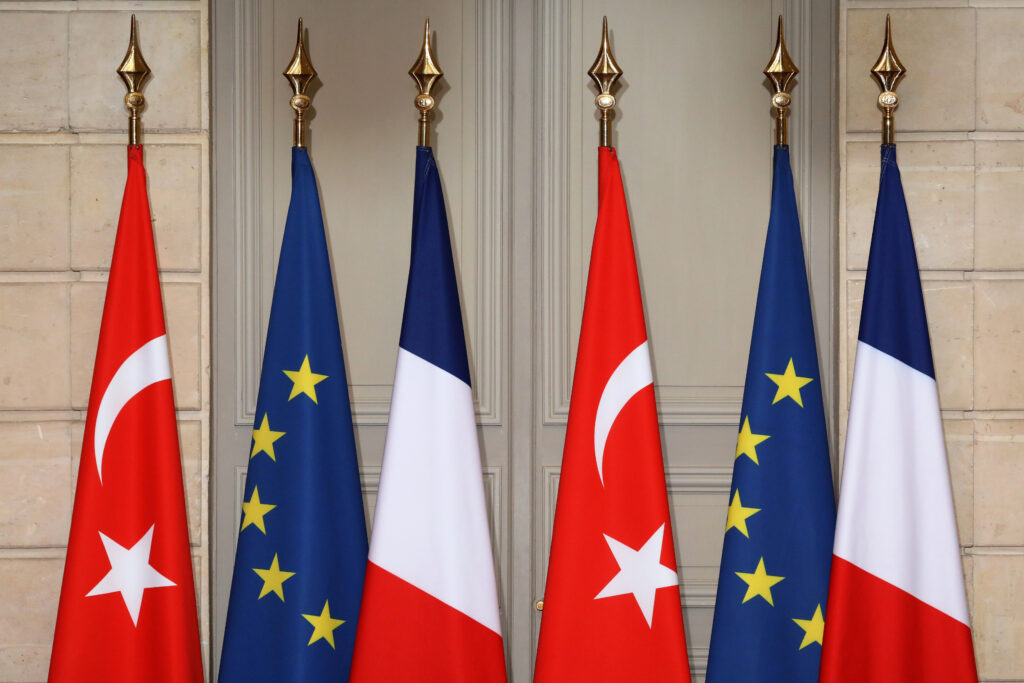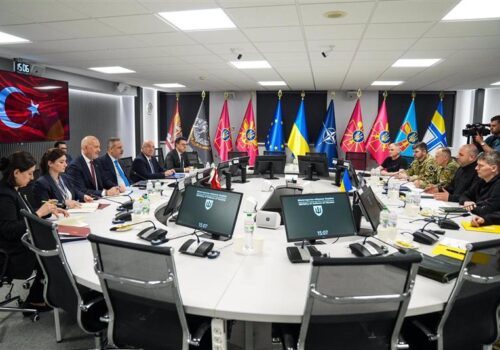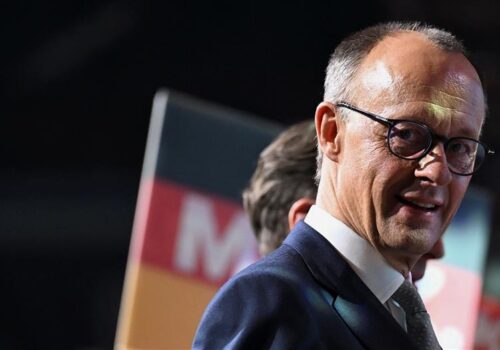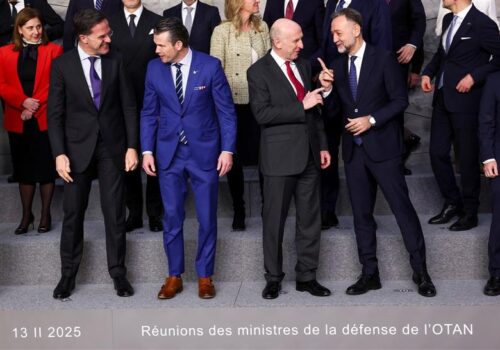Sometimes it seems as though there are few points of alignment in Turkey-France relations. In response to Russia’s aggression in Ukraine and uncertainty over continued US support for European security, several European Union (EU) countries have made a strategic rapprochement with Turkey, even as Franco-Turkish ties have remained stagnant. This is partly because Turkey and France view each other as natural competitors in various geopolitical arenas, including Africa, the Middle East, and the Eastern Mediterranean.
Amid growing calls for enhanced European strategic autonomy and France’s ambition to reduce its reliance on the United States, both Paris and Ankara share incentives to pursue a more pragmatic and structured partnership. For Turkey, recalibrating ties with one of the European Union’s key political and military actors could serve not only to advance bilateral cooperation but also to re-anchor its broader engagement with the EU. A renewed Franco-Turkish strategic framework should prioritize the establishment of a formal dialogue platform, targeted sectoral agreements in the energy and defense industries, and enhanced coordination on diplomatic and security initiatives across the Mediterranean and African theaters. Such a strategy would reflect mutual interests and offer both sides a platform to manage differences while deepening convergence in areas of shared concern.
Geopolitical convergence and divergence
Both France and Turkey pursue strategic autonomy and have expressed frustration with the constraints of alliance politics and multilateral institutions. While this shared emphasis on sovereign decision-making has at times placed them at odds, particularly when their interests clash, it also reflects a common dissatisfaction with the current international order and a common will to reform it. As Yohanan Benhaïm, head of the Contemporary Studies Department at the French Institute for Anatolian Studies in Istanbul, told us, this parallel orientation does not automatically lead to cooperation. But, he said, it offers a potentially underutilized foundation for strategic dialogue, especially within the context of a volatile US foreign policy and an unstable global environment.
Nonetheless, enduring divergences continue to obstruct deeper cooperation. Historical grievances, including disputes between the two countries over France’s recognition of the Armenian genocide and the status of Cyprus, have eroded trust between Paris and Ankara. Their regional agendas frequently clash, with both countries backing rival actors in conflicts across the Middle East and North Africa, such as in Libya. Political and normative differences further complicate the relationship: While France emphasizes democratic governance and the rule of law, Turkey has experienced democratic backsliding in recent years. France’s consistent opposition to Turkey’s EU accession has only deepened Ankara’s sense of exclusion. These tensions are exacerbated by a lack of formal mechanisms for collaboration in key areas such as defense, in which Turkey and France have very limited cooperation.
Moreover, Turkey and France have diverging interests in Africa. Turkey’s expanding diplomatic, economic, and military engagement across the continent has increasingly challenged France’s traditional influence. This shift has been accelerated by Paris’s closures of military bases and subsequent loss of influence in several African countries. In the past several years, a wave of military coups swept across Mali, Burkina Faso, and Niger. French forces withdrew from all three countries after the new military regimes ended defense cooperation amid growing anti-French sentiment and a shift toward new partners, such as Russia. And in the Eastern Mediterranean, Paris and Ankara have often found themselves on opposing—and at times openly conflicting—sides. For instance, in 2020, France openly backed Greece and Cyprus during a maritime dispute between those two countries and Turkey, while Ankara deployed the Oruç Reis vessel to contested waters, heightening the risk of military confrontation. Paris also aligned with Egypt and the United Arab Emirates in countering Turkish actions in Libya, further deepening the geopolitical rift between the two NATO allies.
Economic interdependence
Despite these geopolitical differences, Franco-Turkish economic ties are deeper than often acknowledged. As of 2024, annual bilateral trade exceeded twenty billion euros, and France is one of Turkey’s top foreign investors. More than four hundred French companies are active in Turkey, spanning key sectors including automobiles, energy, retail, and aerospace. This economic relationship is a stabilizing factor and offers space for further development.
Energy is a particularly promising sector. Turkey aspires to become a regional energy hub, a goal that aligns with both French and EU interests in diversifying European energy sources away from Russian supply. French companies could play a crucial role by investing in Turkey’s energy infrastructure, liquefied natural gas terminals, and renewable energy projects. Both countries would also benefit from deeper collaboration in green technology, digital infrastructure, and advanced manufacturing. Turkey’s strategic location and its ambitious infrastructure development plans present opportunities for French engineering and construction firms. Deeper commercial engagement can help prevent the escalation of political disputes. As Benjamin Couteau, a researcher at the Jacques Delors Institute pointed out to us, modernizing the EU-Turkey Customs Union and an updating the EU-Turkey economic cooperation framework would be critical to unlocking this potential.
Defense and security cooperation
Although defense cooperation between France and Turkey has been limited in recent years, both countries possess complementary military capabilities and remain committed members of NATO, offering a basis for renewed engagement. France has emerged as a key player in shaping European defense policy, while Turkey has rapidly expanded its domestic defense industry, making advances in drone warfare, radar systems, and cybersecurity. This growing technological capacity presents opportunities for joint ventures between leading French firms and their Turkish counterparts, especially in areas such as aerospace and systems development.
Maritime security could also benefit from closer collaboration, particularly in the Eastern Mediterranean, where periodic tensions have underscored the need for deescalation mechanisms. In addition, both countries face threats from jihadist networks, making intelligence and counterterrorism cooperation a shared priority. While large-scale defense integration remains unlikely in the short term, more targeted, issue-based collaboration, especially in domains such as asymmetric warfare and cyber defense, could help build a more stable and functional partnership.
Despite multiple military agreements over the past three decades, French arms exports to Turkey have remained modest. Between 2009 and 2019, Turkey ranked only twenty-sixth among French arms clients, with contracts totaling 594.5 million euros. In contrast, Turkey provided 0.28 percent of France’s arms imports between 2008 and 2018. From 2013 to 2022, Turkey imported 473.4 million euros in military equipment from France, a small share compared to France’s global arms exports of 67.9 billion euros. Though Turkey initiated cooperation with the Franco-Italian Eurosam consortium in 2015 to procure SAMP/T air defense systems and signed a formal agreement in 2018, the deal ultimately collapsed. French authorities reportedly halted the project in January 2020 in reaction to Turkey’s military operations in Syria.
But the war in Ukraine and the overthrow of the Bashar al-Assad regime in Syria create opportunities for coordinated military and diplomatic initiatives. France’s recent indications that it could be willing to recognize a Palestinian state represent a rare point of alignment with Turkey that could provide a starting point for deeper engagement in regional crisis diplomacy. These developments suggest that a more structured and forward-looking format, such as a Franco-Turkish Strategic Dialogue Platform, could offer a much-needed institutional space for aligning defense strategies, coordinating regional policies, and developing common positions on critical theaters such as the Sahel, the Black Sea, and the Levant.
Recalibrating France-Turkey ties
To recalibrate their bilateral relationship, France and Turkey should adopt a high-level strategic dialogue platform focused on foreign and security policy. While there are existing lower-level fora for coordination between Turkey and France and there have been recent high-profile bilateral talks, such as Turkish Foreign Minister Hikan Fidan’s visit to Paris in April, there is currently no established and consistent platform for high-level strategic dialogue between the two nations. Such a dialogue would offer an essential venue for high-level coordination, enabling both governments to manage crises more effectively and prevent miscommunication.
Alongside this, as Bahadır Kaleağası, president of the Paris Bosphorus Institute, told us, Paris and Ankara should create sectoral working groups in areas such as energy, infrastructure, technology, and defense to facilitate practical cooperation and generate tangible outcomes beyond symbolic engagement and traditional diplomacy. Cultural and educational exchange also deserves renewed attention. Initiatives that promote student mobility, joint research, and cultural diplomacy can play a vital role in dismantling stereotypes and rebuilding trust at the societal level.
This would help foster sustained academic dialogue and track-two diplomacy, crucial elements for insulating bilateral ties from short-term political turbulence. In places where both countries maintain influence, such as Libya and Syria, there is clear potential for co-mediation or complementary diplomatic roles. These efforts should be framed not as a competition for influence but as parallel stabilization strategies that reflect shared interests in regional security. Reinforcing economic interdependence, particularly through expanded trade and investment in sectors such as renewable energy and digital infrastructure, would further anchor the relationship and enhance resilience during periods of political strain. Finally, France and Turkey must adopt a more constructive posture within NATO, prioritizing strategic alignment and avoiding the use of Alliance structures to score bilateral points.
Uncertainty ahead
Important questions remain unanswered. To what extent could Turkey be involved in the French-UK proposal of a “Coalition of the Willing” to enforce an eventual cease-fire between Ukraine and Russia? And if the United States were to further scale back its presence in Europe, could Turkey emerge as one of NATO’s European pillars? These questions must be addressed at the European level and could compel France to reconcile its longstanding mistrust of Ankara with the growing necessity to integrate Turkey more fully into Europe’s security architecture. In this context, France’s ambition to reassert its influence in the Middle East after the overthrow of the Assad regime may prompt French authorities to adopt a more pragmatic stance toward Turkey. At present, the terms of Turkey’s potential involvement in European defense initiatives remain undefined.
Nonetheless, the evolving European defense landscape presents an opportunity to realize French President Emmanuel Macron’s objective of relaunching debate on Europe’s strategic autonomy. More broadly, the new geopolitical and security realities confronting Europe could create unprecedented openings for deepening ties between Turkey and the EU, beginning with defense, but potentially expanding into the political and economic domains. In the longer term, the combined effects of the war in Ukraine and shifts in US foreign policy could even give rise to two parallel but complementary models of strategic autonomy: one led by Europe with France at its helm, the other by Turkey.
In an era of shifting power dynamics and declining US engagement, France and Turkey face a choice: persist in a rivalry shaped by history and mistrust or embrace a realist recalibration grounded in mutual interests and strategic foresight. The stakes are high. Both nations should seize the opportunity to shape Europe’s emerging security architecture, stabilize key regions, and promote multilateral cooperation.
Riccardo Gasco is the foreign policy program coordinator at IstanPol Institute and a doctoral researcher at Bologna University.
Ulysse Fournillon is an MA Student in European affairs at Aix-Marseille University.
Further reading
Mon, Jul 14, 2025
To help bring lasting peace to Ukraine, Turkey should enhance its cooperation on Black Sea security
TURKEYSource By Yevgeniya Gaber
Thinking beyond mediation, Turkey can help bring lasting peace to Ukraine and ensure stability in the Black Sea region.
Tue, Mar 25, 2025
How Germany’s incoming government will work with Turkey
TURKEYSource By
A stronger German focus on national interests, security, and leading the EU may reshape Germany-Turkey relations to be more transactional in the years ahead.
Fri, Feb 21, 2025
In strengthening its security architecture, Europe shouldn’t discount Türkiye’s role
TURKEYSource By
Europe needs to look outside of its current framework for security solutions. Türkiye can play a role.
Image: Caption: Flags of Turkey, France and the European Union are seen during a joint press conference attended by the French and Turkish presidents at the Elysee Palace in Paris, France, January 5, 2018. REUTERS/Ludovic Marin/Pool




